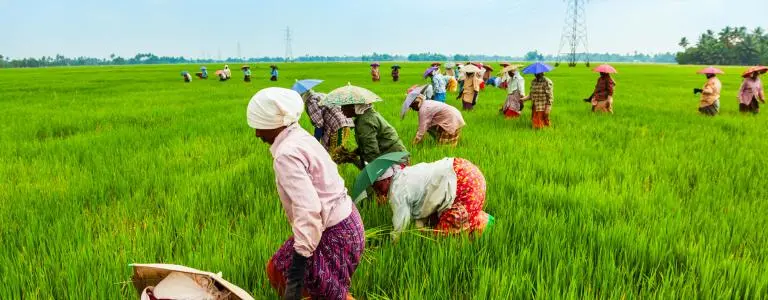
Agriculture Bsc (Hons)
Overview
This BSc (Hons) Agriculture programme aims to educate and raise awareness about the challenges faced by agriculture, particularly in food production and its global impact.
The course provides a solid understanding of agricultural principles, practices, and technologies, enabling graduates to contribute effectively to sustainable agriculture and food security.
This degree covers various aspects such as technology and innovation, environmental sustainability, business and enterprise, and employment and leadership. As a result, students will learn to build sustainable, profitable, and resilient agricultural businesses in various roles such as farmer, land manager, agronomist, economist, policymaker, researcher, scientist, or consultant.
Objectives
- Develop a strong foundation in agricultural sciences.
- Cultivate problem-solving and critical thinking skills.
- Foster innovation and entrepreneurship.
- Prepare students for successful careers in agriculture.
Prerequisites
- Minimum two A-levels or equivalent.
- Strong analytical skills.
- Solid interest in Biology, and Chemistry.
- Passion for agriculture and sustainability.
- Experience in agriculture or related fields is beneficial.
- Strong communication and interpersonal skills.
- English language proficiency is required.
- Desire for positive impact.
Curriculum Outline
- Advanced agricultural technologies and innovations
- Sustainable farming methods and environmental conservation
- Precision farming, crop management, and soil science
- Digital solutions for agronomy and food security
- Principles of agriculture
- Crop production
- Livestock production
- Agricultural economics
- Agricultural engineering
- Agricultural extension
- Research methods
Teaching Method
- Lectures
- Tutorials
- Personal tutors
- Practical sessions
- Laboratory work
- Field trips
- Guest speakers
- Collaborative with industry experts
Modules
- Soil and Environmental Science
- Introduction to the Agri-Food Industry
- Academic and Practical Skills
- Applied Animal Science
- Applied Plant Science
- Business Finance and Accounts
- Innovation and Technology
- Ecosystem Services and Human Wellbeing
- Farm Business Planning
- Personal and Professional Development Skills and Employability
- The Resilience of Agro-Ecosystems
- Animal Health and Welfare
- Agronomy
- Research and Evidence
- Industry Placement
- Crop Technology and Mechanisation
- Livestock Husbandry Systems
- Agricultural Commodities Trading
- Climate Change and Natural Resource Challenges
- Technology and Agroecology Innovation
- Food Supply Systems and Policy
- Specialist Study Module
- Research Project / Dissertation
- Advances in Livestock Nutrition
- Crop Health and Protection
- Sustainable Farm Management
- Agronomy Challenges and Solutions
- Livestock System Challenges and Solutions
- Farm Business Consultancy
Assessment Methods
- Essays
- Group work
- Assignments
- Project work
- Examinations
- Presentations
- Written assignments
- Practical assessments
- Dissertation or research project
Course Duration
This programme may vary depending on the institutions and countries, but the general standard options in the UK are:
- 03 years (full-time).
- 04 years with work placement (optional).
Facilities
- Advanced research laboratories.
- Conduct plant growth experiments.
- Cockle Park Farm and Nafferton Farm.
- Food and consumer research facility.
- Modern computer laboratories.
- Personal tutor.
- Peer mentors.
- Staff-student committee.
- Award-winning career service.
Career Pathways
- Agricultural research
- Agronomist
- Agribusiness
- Nutritionist
- Geneticist / Breeding specialist
- Farm manager
- Agricultural extension
- Government agencies
- Health and welfare manager
- NGOs
- Animal scientist
Fees and Fundings
- Tuition fees are £30,000 per year and may vary depending on the institution.
- Scholarships, grants, and financial opportunities are available.
- Government loan aid is available.
Entry Requirements
- GCSE minimum five GCSEs at Grade C/4 or an equivalent qualification.
- Three A-Levels or equivalent qualifications—recommended one science subject.
- C&G Advanced Technical/BTEC - Level 3 Extended Diploma.
- C&G NPTC/C&G Advanced Technical/BTEC - Level 3 Diploma.
- Strong communication and interpersonal skills.
Field Work and Internships
- Opportunities for fieldwork in modern farming environments.
- Industry placements and internships with leading agricultural companies.
Certifications
- Certified Crop Advisor (CCA)
- Certified Professional Agronomist (CPA)
- Certified Professional Animal Scientist (CPAS)
- Certified Professional Soil Scientist (CPSS)
- Certified Professional Plant Scientist (CPPS)
- Certified Professional Wildlife Biologist (CPWB)
- Certified Sustainable Agriculture Specialist (CSAS)
- Certified Organic Farmer (COF)
- Certified Precision Agriculture Specialist (CPAS)
- Certified Irrigation Specialist (CIS)
- Certified Pest Management Professional (PMP)
- Certified Dairy Specialist (CDS)
- Certified Beef Specialist (CBS)
- Certified Poultry Specialist (CPS)
- Certified Swine Specialist (CSS)
- Certified Aquaculture Specialist (CAS)
Intakes
Typically, it takes twice a year (fall and spring), but may vary like:
- Fall (September/October)
- Spring (January/February)
- Summer (May/June)
Student Testimony
“After completing 3 years studying a level 2 and level 3 diploma in agriculture, I knew I wanted to progress into the agricultural sector in a professional capacity and develop my knowledge.” Says - “Mhairi Lochhead, Diploma in Agriculture.”
Frequently asked questions
Key areas of study typically include crop production, livestock production, soil science, agricultural economics, agricultural engineering, agricultural extension, research methods, and environmental sustainability.